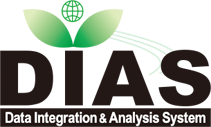


  |  |
| Name | MLIT Telemeter Data |
| Metadata Identifier | MLIT_Telemeter20260120204023-DIAS20221121113753-en |
| Name | Ministry of Land, Infrastructure, Transport and Tourism Water and Disaster Management Bureau River Planning Division River Information Policy Planning Office |
|---|---|
| Organization | Ministry of Land, Infrastructure, Transport and Tourism Water and Disaster Management Bureau River Planning Division River Information Policy Planning Office |
| hqt-dias@gxb.mlit.go.jp |
| Name | DIAS Office |
|---|---|
| Organization | Japan Agency for Marine-Earth Science and Technology |
| Address | 3173-25, Showa-Cho, Kanazawa-ku, Yokohama-shi, Kanagawa, 236-0001, Japan |
| dias-office@diasjp.net |
| Name | Ministry of Land, Infrastructure, Transport and Tourism Water and Disaster Management Bureau River Planning Division River Information Policy Planning Office |
|---|---|
| Organization | Ministry of Land, Infrastructure, Transport and Tourism Water and Disaster Management Bureau River Planning Division River Information Policy Planning Office |
| Name | Ministry of Land, Infrastructure, Transport and Tourism Water and Disaster Management Bureau River Planning Division River Information Policy Planning Office |
|---|---|
| Organization | Ministry of Land, Infrastructure, Transport and Tourism Water and Disaster Management Bureau River Planning Division River Information Policy Planning Office |
publication : 2010-07-05
The telemeter is a system for obtaining, recording, and distributing hydrological observation data in real-time from remote locations managed by the Ministry of Land, Infrastructure, Transport, and Tourism.
This system collects six types of data: precipitation, water level, various dam volumes, snow, water quality, and coastline, and DIAS allows you to view and download all of these using a dedicated application.
climatologyMeteorologyAtmosphere
inlandWaters
| Begin Date | 2017-08-01 |
| End Date | Under Continuation |
| Temporal Characteristics | 10minute |
| North bound latitude | 45.010833 |
| West bound longitude | 127.950556 |
| Eastbound longitude | 144.537778 |
| South bound latitude | 26.474167 |
| Keyword Type | Keyword | Keyword thesaurus Name |
|---|---|---|
| theme | Atmosphere > Precipitation, Human Dimensions > Natural Hazards > , Human Dimensions > Natural Hazards > | GCMD_science |
| theme | Disasters | GEOSS |
| theme | disaster prevention, disaster mitigation | others |
| Keyword Type | Keyword | Keyword thesaurus Name |
|---|---|---|
| theme | DIAS > Data Integration and Analysis System | No_Dictionary |
Japan's River Information for disaster prevention by MLIT (https://www.river.go.jp/index) : https://www.river.go.jp/kawabou/pc/ov
1. This data is to be used only for scientific research or educational purposes and shall not be used for any other purposes, including profit, other than stated in the application form.
2. User shall provide the name, affiliation, and contact information of the person responsible for the research group that will use this data, as well as the purpose of use.
Unless there are certain circumstances, the period of use shall be limited to three years in principle.
In case of a violation of this data policy, the use of the data may be suspended regardless of the period of use.
3. At the end of period of use or in the case of suspension regarding the previous article, The user shall discontinue to use and promptly destroy this data.
However, this shall not apply to the retention of this data as the basis for conference presentations, thesis presentations, journal publications, reports, and others which uses this data.
4. Any modification or change of this data is prohibited.
5. User shall not provide this data to any third party outside of the research group.
6. If a user has made a conference presentation, paper presentation, journal presentation, or report using this data, submit a copy of the publication (reprint in the case of a paper, or a copy of the abstract in the case of an oral or poster presentation) to the contact and mailing address below.
* Contact
River Information Planning Office, River Planning Division, Water Management and Land Conservation Bureau, Ministry of Land, Infrastructure, Transport and Tourism.
Chuo Joint Government Building No. 3,
2-1-3 Kasumigaseki, Chiyoda-ku, Tokyo 100-8918, Japan
Email: hqt-dias@gxb.mlit.go.jp
User also shall submit to the address specified in the Data Policy by the Project.
7. The user shall cooperate with inquiries from the data provider concerning the deliverable using this data (materials submitted to the data provider following article 6.).
[Disclaimer]
1. Data provider is not liable for any losses or any damage when MLIT Telemeter data sets are used.
2. MLIT Telemeter data sets can have possibilities to terminate providing without any prior notice.
3. MLIT Telemeter data sets provided are not supported for any additional processing or analysis.
If data provider does not have data policy, DIAS Terms of Service (https://diasjp.net/en/terms/) and DIAS Privacy Policy (https://diasjp.net/en/privacy/) apply.
If there is a conflict between DIAS Terms of Service and data provider's policy, the data provider's policy shall prevail.
The author(s) shall specify the source whenever using this data in any academic reports, presentations, or publication of scientific results, as in the example below.
Example:
"MLIT Telemeter data used for this study are provided by Ministry Land, Infrastructure, transport and Tourism, Japan"
If you plan to use this dataset for a conference presentation, paper, journal article, or report etc., please include acknowledgments referred to following examples. If the data provider describes examples of acknowledgments, include them as well.
" In this study, [Name of Dataset] provided by [Name of Data Provider] was utilized. This dataset was also collected and provided under the Data Integration and Analysis System (DIAS), which was developed and operated by a project supported by the Ministry of Education, Culture, Sports, Science and Technology. "